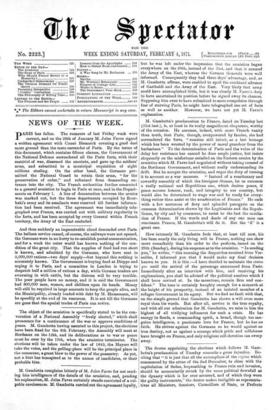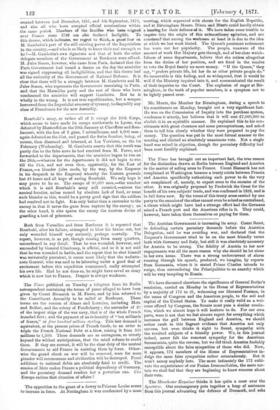The decree appointing the elections which follows M. Gam- betta's
proclamation of Tuesday commits a gross injustice. Re- citing that " it is just that all the accomplices of the regime which commenced by the crime of the 2nd December, to close with the capitulation of Sedan, bequeathing to France ruin and invasion, should be momentarily struck by the same political downfall as the dynasty which is for ever accursed, and of which they were the guilty instruments," the decree makes ineligible as representa- tives all Ministers, Senators, Councillors of State, or Prefects created between 2nd December, 1851, and 4th September, 1870, ' and also all who have accepted official nominations within the same period. Members of the families who hate reigned over France since 1789 are also declared ineligible. To this decree, whicla indicates, we regret to think, a great fear on M. Gambetta's part of the still existing power of the Imperialists in the country,—and who is so likely to know their real strength as he ?—M. Gambetta's own signature and that of both the other delegate members of the Government at Bordeaux were affixed. M. Jules Simon, however, who came from Paris, declared. that the Paris Government had issued a decree on the day the armistice' was signed suppressing all ineligibilities, and that this decree had ' all the authority of the Government of National Defence. It is clear that there will be a struggle between M. Gambetta and M. Jules Simon, who represents the Government remaining in Paris, and that the Marseilles party and the rest of those who have condemned the armistice will support Gambetta. But he is wholly in the wrong. It is not true republicanism, but a weapon borrowed from the Imperialist armoury of tyranny, to disqualify any class of Frenchmen for the new Assembly.































 Previous page
Previous page